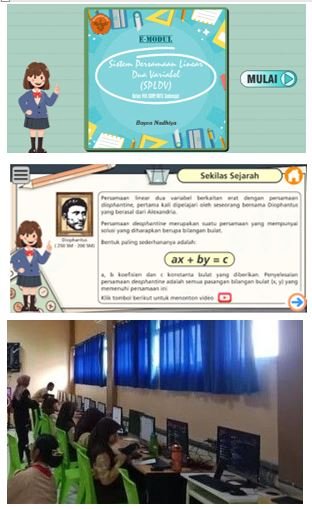Designing an Interactive Digital Magazine E-Module to Foster Mathematical Problem-Solving Skills through Differentiated Instruction
https://doi.org/10.51574/kognitif.v5i3.3375
Keywords:
Interactive E-Module , Digital Magazine , Differentiated Instruction , Mathematical Problem-Solving , Problem-Based Learning (PBL)Abstract
A major challenge in junior high school mathematics learning, particularly in the topic of Systems of Linear Equations in Two Variables (SLETV), lies in students’ low problem-solving ability, stemming from instructional materials that fail to accommodate diverse learning styles. This study aims to develop and evaluate an interactive digital magazine based e-module that integrates Problem Based Learning (PBL) and supports differentiated instruction to enhance students’ mathematical problem-solving skills. A development research design was employed using the ADDIE model (Analysis, Design, Development, Implementation, Evaluation). Participants included subject-matter experts, media experts, mathematics teachers, and eighth-grade students at SMPN 7 Jambi City. Instruments consisted of validation questionnaires, practicality questionnaires, and problem-solving tests. The research procedure covered expert validation, individual testing, small-group testing, and large-group testing. Quantitative data were analyzed using statistical software to assess validity, practicality, and effectiveness. Results show that the e-module is highly valid, practical, and effective in improving students’ problem-solving ability, as indicated by the N-Gain scores. This interactive e-module offers a promising alternative instructional medium that supports differentiated instruction and contributes to the development of 21st-century skills.
Downloads
References
Ananda, S. F. D., & Fauziah, A. N. M. (2022). Penerapan model pembelajaran Problem Based Learning untuk meningkatkan kemampuan berpikir kritis siswa. Jurnal Pendidikan, Sains dan Teknologi, 9(2), 390–403. https://doi.org/10.47668/edusaintek.v9i2.491
Ansari, B. (2017). Komunikasi Matematis Strategi Berpikir dan Manajemen Belajar. Banda Aceh: Penerbit Pena.
Awalia, N. (2023). Model Problem Based Learning dan self confidence terhadap kemampuan pemecahan masalah matematis siswa. Plusminus: Jurnal Pendidikan Matematika, 3(2), 277–288. https://doi.org/10.31980/plusminus.v3i2.1343
Bajri, S. H., Gunadi, F., & Lestari, W. D. (2024). Kemampuan pemecahan masalah berdasarkan kemampuan awal antara Problem Based Learning dan Case Based Learning. Jurnal Derivat, 11(3), 272–280. https://doi.org/10.31316/jderivat.v11i3.6606
Clements, D. H., & Sarama, J. (2016). Digital technologies in the early primary school classroom. International Journal of Education & Development using ICT, 12(1), 4–20.
Dos Santos Gonçalves, A. (2017). Menggagas Solusi Pembelajaran Bahasa di Tengah Problema Bangsa (Pembelajaran Bahasa Portugis di Timor Leste). Jurnal Inovasi dan Teknologi Pembelajaran, 1(1), 1-10. https://doi.org/10.17977/um031v1i12014p001
Fatin, A., Harahap, M., & Lubis, R. (2023). Pengembangan e modul trigonometri berbasis Android untuk meningkatkan kemampuan penalaran matematis siswa. Jurnal MathEdu, 6(1), 6–14. https://doi.org/10.37081/mathedu.v6i1.3949
Hamid, J., & Rahmawati, N. I. (2024). Developing ethnomathematics based e modules to support students’ problem solving skills. EDUMATIKA: Jurnal Riset Pendidikan Matematika, 7(1). https://doi.org/10.32939/ejrpm.v7i1.3427
Harmini, T., & Effendi, L. (2018). The effect of the use of differentiated instruction based module on students’ learning motivation. Unnes Journal of Mathematics Education, 7(3), 141–146. https://doi.org/10.15294/ujme.v7i3.26764
Hmelo Silver, C. E. (2004). Problem based learning: What and how do students learn? Educational Psychology Review, 16, 235–266. https://doi.org/10.1023/B:EDPR.0000034022.16470.f3
IEA. (2015). TIMSS 2015 results. Retrieved May 17, 2025, from https://www.iea.nl/studies/iea/timss/2015/results
Istiqomah, R., Restuning, S., Herijulianti, E., & Nurnaningsih, H. (2021). Efektivitas pembelajaran daring pada masa pandemi COVID-19. Jurnal Kesehatan Siliwangi, 2(2), 605–611. https://doi.org/10.34011/jks.v2i2.687
Jayanti, R. D., Kesumawati, N., & Yuliana, I. (2024). Penerapan model Problem Based Learning untuk meningkatkan kemampuan pemecahan masalah peserta didik pada materi lingkaran. Jurnal Inovasi Pendidikan Matematika, 7(1), 85–94. https://doi.org/10.31851/indiktika.v7i1.14940
Kadir. (2008). Kemampuan Komunikasi Matematik dan Keterampilan Sosial Siswa Dalam Pembelajaran Matematika. Seminar Nasional Matematika dan Pendidikan Matematika, 339-350.
Kurniawati, E., & Mahmudi, A. (2025). Developing e module realistic mathematics education to improve problem solving abilities and interest in learning. International Journal of Multicultural and Multireligious Understanding, 12(1). http://dx.doi.org/10.18415/ijmmu.v12i1.6489
Maximizing Learning Management Systems to Support Mathematical Problem Solving (2021). Teachers College Record. https://doi.org/10.1177/0040059921996730
Munawaroh, S., Ahmadah, I. F., & Purbaningrum, M. (2021). E-Magmath berbasis flipbook pada materi himpunan di kelas VII SMP/MTs. Jurnal Pembelajaran Matematika Inovatif, 4(1), 45–54. https://doi.org/10.22460/jpmi.v4i1
Nasution, H. (2024). Development of differentiated learning based interactive e modules to improve learning effectiveness. Jurnal Ilmiah Pendidikan, Universitas Malang. https://journal2.um.ac.id/index.php/jip/article/view/53501
Putra, J., & Yulita. (2019). Penerapan model PBL untuk meningkatkan kemampuan pemecahan masalah matematika peserta didik kelas XII MIPA 2 SMAN 12 Pekanbaru. Jurnal Prinsip Pendidikan Matematika, 1(2), 78–88. https://doi.org/10.33578/prinsip.v1i2.32
Putri, P. D. A., Anriani, N., & Ihsanudin. (2024). Pengembangan e modul berbasis Android menggunakan Kodular untuk meningkatkan kemampuan pemecahan masalah siswa SMP. Jurnal Pendidikan Matematika, 15(1), 47–59. https://doi.org/10.36709/jpm.v15i1.146
Putri, R. S., Suryani, M., & Jufri, L. H. (2019). Pengaruh penerapan model Problem-Based Learning terhadap kemampuan pemecahan masalah matematika siswa. Mosharafa: Jurnal Pendidikan Matematika, 8(2), 331–340. https://journal.institutpendidikan.ac.id/index.php/mosharafa/article/view/566
Rosnaeni, R. (2021). Karakteristik dan asesmen pembelajaran abad 21. Jurnal Basicedu, 5(5), 4334–4339. https://doi.org/10.31004/basicedu.v5i5.1548
Rofiyadi, Y. A., & Handayani, S. L. (2021). Pengembangan aplikasi e-modul interaktif berbasis Android materi sistem peredaran darah manusia kelas V sekolah dasar. Jurnal Pendidikan Dasar Indonesia, 6(2), 54–60. https://doi.org/10.26737/jpdi.v6i2.2575
Rusman. (2014). Model-Model Pembelajaran Mengembangkan Profesionalisme Guru. Jakarta : Rajawali Press.
Sudjana. (2018 ). Metoda Statiska. Bandung: PT. Tarsito Bandung.
Suryawan, H. P. (2020). Pemecahan masalah matematis. Yogyakarta: Sanata Dharma.
Tukiran Taniredja, d. k. (2017). Model-Model Pembelajaran Inovatif dan Efektif. Bandung: Penerbit Alfabeta
Tomlinson, C. A., & Moon, T. R. (2015). Assessment and student success in a differentiated classroom. Virginia, USA: ASCD.
Voskoglou, M. G., & Buckley, S. (2012). Problem solving and computational thinking in a learning environment. Computers & Education, 59(2), 619–630. https://doi.org/10.1016/j.compedu.2012.03.029
Wahyudi, D. (2019). Pengembangan e-modul dalam pembelajaran matematika SMA berbasis Android. GAUSS: Jurnal Pendidikan Matematika, 2(2), 1. https://doi.org/10.30656/gauss.v2i2.1739
Xia, M., Wei, H., Xu, M., Lo, L. Y. H., Wang, Y., Zhang, R., & Qu, H. (2019). Visual analytics of student learning behaviors on K 12 mathematics e learning platforms. IEEE Transactions on Learning Technologies, 12(4), 365–378. https://doi.org/10.1109/TLT.2019.2915737

Downloads
Published
How to Cite
Issue
Section
License
Copyright (c) 2025 Bayva Nadhiya, Wardi Syafmen, Novferma

This work is licensed under a Creative Commons Attribution-ShareAlike 4.0 International License.
Education and Talent Development Center of Indonesia (ETDC Indonesia)
e-mail: kognitif@gmail.com, website : https://etdc-indonesia.com

Kognitif: Jurnal Riset HOTS Pendidikan Matematika dengan Situs: https://etdci.org/journal/kognitif berlisensi Creative Commons Attribution-ShareAlike 4.0 International License









.png)

